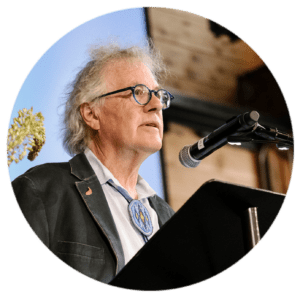
Founder
The confluence of the Kitlope and Gamsby Rivers. Photo credit: Sam Beebe
The story of our bioregion is real, immediate, and fundamentally hopeful.
This week we had an important reminder that culture trumps data. Story was more important than fact. Popular culture was more important than substance. Myth beat pundits, polls and even outdid the popular vote.
Reality TV became reality, and now Americans — and our friends and foes around the world — enter a new era whose consequences could last generations.
We desperately need a new story, a new myth. “A myth of the planet,” said Joseph Campbell, teacher, writer, and mythologist, in his last interview before his death, with Bill Moyers.
We need a myth that celebrates community. To celebrate community is also to embrace complexity, and perhaps we will see over the next few years whether the wiggly lines of nature and community transcend and are more powerful than the straight lines of party politics, warmongering, and renewed colonialism that seem to be at the heart of a new, troubled polity that appeals to the worst in us.
Here in the broader Pacific Northwest, we look to our geography to shape our sense of direction and our relationship to the rest of the world. We believe there is hope in the political, economic, and ecological synergy between country and city: between the country that is capable of producing goods and services, and the city whose denser populations depend on them. Services like clean water, a stable climate, cheap renewable energy and building materials, healthy food, open space in which to recreate in the country; and the markets, capital, and technology that rural farmers, ranchers, loggers, and fishers find mostly in the city. Oregon is still divided red and blue, city and country, as is much of the country — but it need not be so.
In America, we celebrate the eagle, but to paraphrase Yeats, what just happened is that the falcon could not hear the falconer, things fell apart, and the center did not hold. But on the West Coast, we have a different story. At Ecotrust we call it Salmon Nation, and we voted blue. New England, Lobster Nation, did as well.
Is it too big a stretch to suggest that there is something hopeful about a bioregion that favors “la matria” vs “la patria” — matriotism vs patriotism? That out west, our popular culture nourishes the distinctive qualities of place? That our myth meets reality in the particular nature of our soils, our waters, our coastline, forests and mountains, vibrant cities that attract young people — as well as the full diversity of our residents?
What does that mean? Well, one small example is Portland’s Redd on Salmon Street. It is but one of myriad local, non-governmental initiatives designed to nurture the synergy between country and city. The Redd is two full city blocks in the heart of the Central Eastside Industrial District, where Ecotrust is building a tangible example of the infrastructure needed by ranchers, farmers, and fishers to truck, store, process, deliver and market food to the schools, hospitals, institutional cafeterias, restaurants and grocers looking for healthy, local food. Wood for the restoration of a 100-year-old ironworks building on the campus has been sourced from gifts from the Coquille Indian Tribe, and select harvesting and custom cut fir, hemlock and cedar from Ecotrust Forest Management properties on the coast. The Redd is designed to create co-working space for the marketing, branding, finance and legal services that young food entrepreneurs need to grow their businesses. Named for the salmon’s nest in the gravel of cold clear streams where salmon spawn, the Redd will nourish the very core of a principled and mutually dependent and productive exchange between rural and urban people. A mixing of red and blue that binds us, rather than divides us.
Regenerative agriculture, walkable cities, solar energy, and more resource-efficient technologies — there are enormous pools of demand for a new U.S. economy founded in sustainability, as described in a recent book, The New Grand Strategy. This is fact, not myth, and deserves the support of more enlightened governmental policy in whatever hue.
Meanwhile, Beneficial State Bank, a California-based bioregional bank targeting triple bottom line results for diverse business, individuals, and communities, will soon begin construction of the tallest and one of the very first mass wood commercial buildings in the nation here in Portland, using wood from Northwest forests.
Here there is an almost infinite amount of regional energy devoted to building a new economy, while embracing the diversity of our residents, the health of our natural systems, and the natural competitive advantage of our geography in this, our bioregion. The opportunity derives from a very different story than the one sold to Americans earlier this week. It is the core of a different myth that arises from a sense of community, of shared destiny, of an open embrace of a larger global community.
It is our myth, our story. It is both an old and a new myth that defines this, our corner of the planet. It is real, it is immediate, and it is fundamentally hopeful, because where red meets blue is the color of the future, and, like the rain forests of our home, it is green.

WEBSITE
The Redd on Salmon Street is a working hub for the regional food economy.